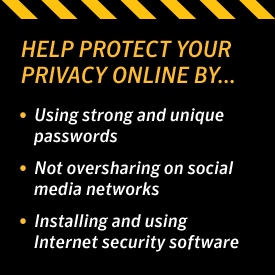Tips for protecting your privacy online
With online spying in the news, you may be wondering who’s watching where you go online and what sites you visit. This is a legitimate concern.

With online spying in the news, you may be wondering who’s watching where you go online and what sites you visit. This is a legitimate concern. After all, where you go and what you read on the Internet is your business, right?
But in the 21st century, information is the new currency—something you’ve probably noticed since it’s becoming more and more difficult to shield yourself from all of the prying eyes out there. Not to worry. There are several things you can do to help, and we’re here with tips for keeping your online privacy safe:
Social Networks
“Hi everyone! I’m going to be out of town this weekend. The new boss is driving me crazy, so I’m going out to spend way too much and enjoy life!!!”

Do you or any loved ones leave updates like this? If so, think twice.
What do these types of updates reveal?
Plenty of personal information, if you aren’t careful. By reading the post above, criminals could decide this weekend would make a fine time to ransack the author’s home; future potential employers might decide against extending that job offer; and a credit card company may think twice about that recent application.
How do I keep this private?
Easy. Don’t reveal too much online. Once something is out on websites, it can be resent, retweeted, and rebroadcast thousands of times. Switching your privacy settings so you only show updates to friends can also help corral your information. Just remember who you’ve friended, so you aren’t complaining about your company’s management to the people in management!
Cookies
You may have heard the term used in relation to your browser, but not fully understood what it meant. If so, let’s clear that up.
What cookies reveal:
A Web browser cookie stores information on your device about the sites you visit and more. Think of them as your fingerprints or breadcrumbs for others to read. They can save you the trouble of retyping the same things over and over (great!), but site owners can also use them to peer into your browsing history (maybe not so great). The invasion of privacy risk is so great that Europe enacted regulations to inform website visitors if cookies are present.
How do I keep this private?
If you don’t like the idea of telling everyone where you’ve been on the Web, you can clear out your cookies and refuse to accept any more. Simply go into your preferred browser’s options and look for settings on privacy or your history. Just bear in mind that after clearing them out, you’ll then need to reenter all of your login or location information at sites that require it. Since there are pros and cons to cookie usage, you might want to consider only deleting cookies to the places you don’t often frequent, while leaving them for those you often return to (e.g., your favorite online email, news, and weather sites).
Links
So if you clear (or at least curtail) your cookies, you’re the invisible person, right? Not quite. Others can still track you online by inserting code in links. If you’ve ever clicked a link or banner, someone has likely tracked you.
What they reveal:
The source of your click, like an email or Web page, what time you clicked the link, and more. Businesses like to gather this information to see what makes you tick by what you click. For example, if a link about dogs prompts you to click, you probably like dogs and own one. Hope you’re ready for more offers based on our canine friends because here come the hounds!
How do I keep this private?
Depending upon the code placed in the link, you may or may not be able to hide the information. One thing you can do is retype the URL in your browser. This will ensure there’s no tracking involved.
What it reveals:
Linking social media sites, bank accounts, and all other online accounts to one email address may seem like a convenient idea, but it’s one that provides a hacker with a whole lot of helpful information in one setting.
How do I keep this private?
Using multiple email addresses is the best way to protect against this issue. Use one for social accounts and one for financial accounts at the very least to keep your information safe.
Want more help? Norton Identity Safe stores all of your passwords securely for use across all of your browsers without the use of multiple cookies. It can help keep your privacy safe from prying eyes, while you enjoy the convenience of never forgetting or retyping your login information. It can also fill in forms and more—all for free. Learn more here.
Editorial note: Our articles provide educational information for you. Our offerings may not cover or protect against every type of crime, fraud, or threat we write about. Our goal is to increase awareness about Cyber Safety. Please review complete Terms during enrollment or setup. Remember that no one can prevent all identity theft or cybercrime, and that LifeLock does not monitor all transactions at all businesses. The Norton and LifeLock brands are part of Gen Digital Inc.





Want more?
Follow us for all the latest news, tips, and updates.